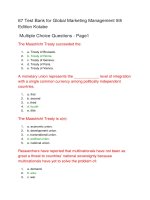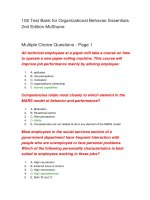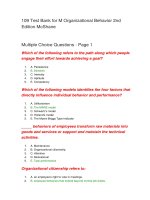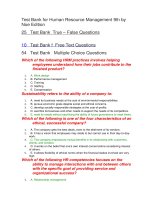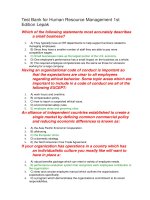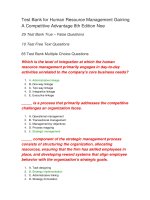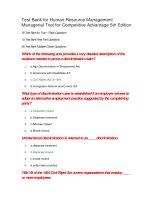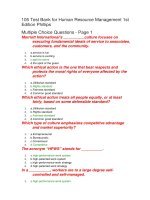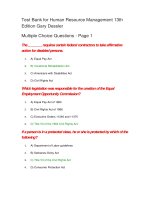Test bank for human resource management 2nd edition stewart
Bạn đang xem bản rút gọn của tài liệu. Xem và tải ngay bản đầy đủ của tài liệu tại đây (97.94 KB, 18 trang )
Test Bank for Human Resource
Management 2nd Edition Stewart
Organizations with a competitive business strategy of differentiation are
expected to do best with which HR strategy?
1.
a) Committed Expert or Free Agent HR strategy
2.
b) Free Agent or Loyal Soldier HR strategy
3.
c) Bargain Laborer or Loyal Soldier HR strategy
4.
d) Loyal Soldier or Committed Expert HR strategy
Business-level strategy:
1.
2.
a) is not related to human resources strategy
b) deals with how the organization will compete with companies that provide
similar goods and services
3.
c) includes decisions related to business type
4.
d) should be completed after human resources strategy is determined
What steps are involved in the strategy formulation process?
1.
a) customer and employee surveys, decision making, and evaluation
2.
b) environmental analysis, internal analysis, problem solving
3.
c) gathering information, analysis and decision making, and implementation
4.
d) external analysis, internal analysis, identification of strengths and weaknesses
The universalistic approach to human resource practices:
1.
2.
a) seeks to identify human resource practices that benefit all organizations
b) claims that appropriate human resource practices depend upon the
organization and its strategy
3.
c) works best with a cost leadership strategy
4.
d) is an individual company approach to human resource management
Research supports which of the following findings:
1.
a) organizations with a cost leadership strategy have higher performance when
their human resource practices include selective staffing, comprehensive technical
training and group incentives
2.
b) organizations employing the Free Agent HR strategy have higher performance
when their human resource practices include selective staffing, comprehensive
technical training and group incentives
3.
c) organizations with a differentiation strategy have higher performance when their
human resource practices include selective staffing, comprehensive technical
training and group incentives
4.
d) organizations employing the Bargain Laborer strategy have higher performance
when their human resource practices include selective staffing, comprehensive
technical training and group incentives
Organizations with matching competitive and human resource strategies:
1.
a) are not commonly found among U.S. companies
2.
b) perform only marginally better than those without matching strategies
3.
c) have been found to have higher morale among employees
4.
d) typically have an external labor orientation
Organizations that attempt to pursue a combination strategy that involves
both cost leadership and differentiation:
1.
a) Is likely to excel in both cost leadership and product differentiation
2.
b) Usually end up not succeeding at either cost leadership or differentiation
3.
c) Is likely to succeed at product differentiation
4.
d) Is likely to succeed at cost leadership
Which of the following is not an example of a commitment strategy
practice?
1.
a) Broad job responsibilities, organizing work around teams and pay for
performance
2.
b) Two way communication, pay for performance, and highly selective recruiting
practices
3.
c) Long term relationships with employees, extensive new employee training and
high levels of pay
4.
d) Specialized and narrow job responsibilities, emphasis on individual
accomplishment and performance and pay for performance
Which type of strategy focuses on how to serve the needs of company
customers?
1.
a) human resource strategy
2.
b) short term strategy
3.
c) long term strategy
4.
d) competitive business strategy
Which of the following is NOT true of a human resource strategy that
emphasizes hiring and retaining loyal employees who do whatever the
company asks of them?
1.
a) it is referred to as the Loyal Soldier HR strategy
2.
b) employees are hired early in their careers and developed with extensive training
3.
c) emphasis is on hiring employees who do not demand high wages
4.
d) these types of organizations are frequently unionized
Strengths and weaknesses
1.
a) should be kept confidential
2.
b) are areas of high and low capability
3.
c) relate to the external environment
4.
d) are an outcome of strategic planning
An organization with the human resource strategy that combines
emphasis on short-term employees with a focus on producing unique
goods and services:
1.
a) is employing the Committed Expert HR strategy
2.
b) is employing the Bargain Laborer HR strategy
3.
c) is employing the Loyal Soldier HR strategy
4.
d) is employing the Free Agent HR strategy
Which of the following are consistent with a differentiation strategy?
1.
a) A focus on cost reduction, a unique product and a large share of the market
2.
b) A unique product, strong marketing, and excellent customer service
3.
c) Disregard for cost, few producers in the market and a focus on a unique product
4.
d) A focus on marketing and the production of basic or standardized products and
services
An organization employing a differentiation strategy is likely to
differentiate its goods or services in all of the following ways EXCEPT:
1.
a) a unique product
2.
b) low cost
3.
c) marketing the product as distinctive and a good value
4.
d) excellent customer service
Which of the following is NOT consistent with a human resource bundle
supporting a control strategy?
1.
a) strict work rules
2.
b) limited formal training
3.
c) employee career development
4.
d) narrow job responsibilities
From a human resource management perspective the two types of
strategy are:
1.
a) competitive business strategy and human resource strategy
2.
b) long term and short term strategy
3.
c) short and long term human resource strategy
4.
d) human resource strategy and long term strategy
Apple computer produces the iPad, that is described by Apple as “A
magical and revolutionary product…” From what you know about the iPad
and Apple computer:
1.
a) Apple has a low cost leadership strategy
2.
b) Apple is very conscious of expenses
3.
c) Apple computer has a differentiation strategy
4.
d) Apple probably employs a large number of temporary employees
An organization with an internal labor orientation seeking cost reduction
can benefit from:
1.
a) the Free Agent HR strategy
2.
b) the Loyal Soldier HR strategy
3.
c) the Committed Expert HR strategy
4.
d) the Bargain Laborer
Which of the following is NOT true of organizations with a cost leadership
strategy?
1.
a) the organization seeks to become low-cost producers
2.
b) the organization seeks to produce superior goods and services
3.
c) the organization seeks to become highly efficient
4.
d) controlling expenses is very important
Which type of strategy focuses on choices and actions concerning the
management of people?
1.
a) competitive business strategy
2.
b) human resource strategy
3.
c) short term human resource strategy
4.
d) short term strategy
Which of the following is characteristic of organizations with an external
labor orientation?
1.
2.
a) the organization seeks to buy talent
b) a primary goal is to identify employees who will have long careers with the
organization
3.
c) people are hired early in their careers
4.
d) employees identify closely with the organization
To be true strengths, human resource practices must:
1.
a) also provide something that is difficult to imitate or substitute
2.
b) be part of a differentiation business strategy
3.
c) be part of a low cost business
4.
d) include effective employee and labor relations
The physical and social factors outside an organization’s boundaries
which are relevant for strategic planning:
1.
a) exclude government and political actions
2.
b) are strengths and weaknesses
3.
c) are assessed through customer and employee satisfaction surveys
4.
d) are opportunities and threats
Elements of the environment relevant for analyzing the external
environment include all of the following EXCEPT:
1.
a) demographic and cultural trends
2.
b) economic and political conditions
3.
c) organizational culture and employee satisfaction
4.
d) technological developments
Which of the following is TRUE about human resource strategy?
1.
a) the ability to attract and keep high-quality employees is always a competitive
advantage
2.
b) a human resource strategy is usually relatively easy for competitors to imitate
3.
c) rarely can a competitor imitate an entire package of human resource strategies
4.
d) an organization can overcome the lack of effective human resource
management by pursuing a differentiation strategy
Human resource management is critical for strategic planning:
1.
a) because high-quality employees are relatively rare
2.
b) mainly when an organization requires technological skills
3.
c) because of the high cost of compensation
4.
d) mainly when an organization requires general skills
An organization with a cost-leadership strategy:
1.
a) seeks to become the low cost producer of complex and unique goods and
services
2.
b) has excellent customer service
3.
c) is likely to be one of many producers in the market
4.
d) is likely to have a relatively large share of the market and produce basic or
standardized products and services
Which of the following is true about assessing the external environment?
1.
a) strengths and weaknesses are the easiest factors to control
2.
b) understanding strengths and weaknesses of competitors is a critical factor
3.
c) opportunities are generally easier to control, but a clear understanding of
opportunities and threats is critical for effective strategy formulation
4.
d) strengths are generally easier to control, but a clear understanding of strengths
and weaknesses is critical for effective strategy formulation
Research suggests these four steps can be used to make more effective
decisions:
1.
a) set specific deadlines, gather information, minimize conflict, vote on all items
2.
b) ensure top level management is involved, train decision makers, set specific
deadlines, minimize conflict
3.
c) set specific deadlines, ensure top level management support, minimize conflict,
diffuse politics
4.
d) build collective intuition, stimulate conflict, maintain an appropriate pace, diffuse
politics
The contingency approach to human resource practices:
1.
a) Tends to focus on broad principles
2.
b) Can be effective in an organization pursuing human resource role differentiation
3.
c) Tends to focus on specific human resource practices
4.
d) Is supported by corporate strategy and business strategy
Organizations pursuing a differentiation strategy pursue all of the
following strategies EXCEPT:
1.
a) adapting rapidly to changing customer preferences
2.
b) innovation of products and services
3.
c) taking risks and continually prospecting for new ways of doing things
4.
d) increasing distribution channels
An organization with the human resource strategy that combines
emphasis on short-term employees with a focus on reducing costs:
1.
a) is employing the Committed Expert HR strategy
2.
b) is employing the Bargain Laborer HR strategy
3.
c) is employing the Loyal Soldier HR strategy
4.
d) is employing the Free Agent HR strategy
Corporate-level strategy:
1.
2.
3.
4.
a) is concerned with how an organization or part of the organization will compete
with other organizations that produce similar goods and services
b) is not related to human resource strategy
c) concerns the different businesses and diversity of products and services that an
organization produces
d) focuses on different ways of managing employees of an organization
Which of the following is NOT true about human resource bundles?
1.
a) human resource bundles are human resource practices that are internally
consistent and reinforce each other
2.
b) there are human resource practices that bundle into a “control strategy”
3.
c) there are human resource practices that bundle into a “commitment strategy”
4.
d) human resource practices that are bundled are easy for competitors to simulate
The view that human resource practices differ based upon an
organization’s competitive business strategy:
1.
a) is the universalistic approach
2.
b) is consistent with the contingency approach
3.
c) is the differentiation approach
4.
d) is the only way human resource practices can be considered
Human resources are relatively easy for an organization to duplicate;
therefore, it cannot be a source of competitive advantage.
1.
True
2.
False
Internal politics over group decision making, processes and outcomes
should be encouraged as it can enhance outcomes.
1.
True
2.
False
A clear strategy for being better than competitors and a highly motivated
workforce are major keys for long term profitability.
1.
True
2.
False
HR processes for the commitment strategy are specific and consistent
across organizations, which makes them easy to duplicate for
organization success.
1.
True
2.
False
The universalistic perspective seeks to identify methods of managing
people that are effective for all organizations.
1.
True
2.
False
Opportunities are generally easier to control than threats.
1.
True
2.
False
There is some evidence that organizations naturally tend to adopt the
human resource practices that match their competitive strategies.
1.
True
2.
False
Groups of people who meet together often to discuss information can
develop an effective sense of “gut level” decision making about proper
strategic direction.
1.
True
2.
False
An organization with an external differentiation strategy is likely to excel
when it follows the free agent HR strategy.
1.
True
2.
False
An organization can use an effective strategy to compensate for weak
human resources.
1.
True
2.
False
For strategic planning purposes an organization should concentrate
mainly on enhancing strengths so past success can be carried into the
future.
1.
True
2.
False
It is easy for an organization to pursue both cost leadership and
differentiation strategies simultaneously.
1.
True
2.
False
In order for a human resource practice to be a strength, it must be difficult
to imitate and a similar practice cannot be substituted.
1.
True
2.
False
The contingency approach to human resource management practices and
the universalistic approach to human resource management are
complementary and can be used together to develop an overall human
resource strategy.
1.
True
2.
False
Studies comparing the control and commitment strategies almost always
conclude that in most cases the control strategy works best.
1.
True
2.
False
Many organizations do have human resource strategies that fit their
competitive strategies.
1.
True
2.
False
Strategy formulation is best accomplished by a group of decision makers.
1.
True
2.
False
Support for the commitment strategy is so strong that all organizations
should adopt this strategy and the related human resource practices to be
successful.
1.
True
2.
False
Effective human resource management capabilities are difficult to copy
because effectiveness comes not from a single practice but from a
number of related practices.
1.
True
2.
False
The human resource bundle that is known as a commitment strategy
includes empowerment of workers, careful screening of recruits, high
levels of teamwork, and extensive sharing of information.
1.
True
2.
False
All information is relevant for strategic planning.
1.
True
2.
False
There is usually only one company that can be the lowest-cost provider in
an industry.
1.
True
2.
False
Information on new job creation is a critical feature of the external
environment that is relevant for an organization’s strategic planning.
1.
True
2.
False
If a company is pursuing a low cost strategy, it is important that
employees only perform duties specified in their job description.
1.
True
2.
False
An organization pursuing a differentiation strategy can mostly ignore
expenses and costs.
1.
True
2.
False
Information about threats and opportunities should be gathered early in
the strategic planning process.
1.
True
2.
False
An organization with an internal labor orientation tends to save money in
their selection processes because they promote from within.
1.
True
2.
False
A lowest-cost provider is likely to be a small start-up business because
the owner will provide labor.
1.
True
2.
False
Regardless of a company’s strategy, high quality human resources are a
true competitive advantage.
1.
True
2.
False
During strategic planning, organizations should focus on understanding
only weaknesses so they have an understanding about areas in need of
improvement.
1.
True
2.
False
Unlike the cost leadership strategy, a large number of organizations can
simultaneously pursue the differentiation strategy.
1.
True
2.
False
Groups making decisions should set a flexible timeline to help move
decision making forward.
1.
True
2.
False
A strategy that focuses on different ways to provided goods and services
that meet customer needs is a competitive human resource strategy.
1.
True
2.
False
Controlling expenses is critical to an organization seeking a cost
leadership strategy.
1.
True
2.
False
A primary strength of the internal labor orientation is flexibility because
internal employees can easily be trained and redeployed as the
organization changes priorities.
1.
True
2.
False
The external environment for a company consists of physical and social
factors outside the organization EXCEPT government legislation at all
levels.
1.
True
2.
False
10 Free Test Bank for Human Resource
Management 2nd Edition Stewart Free Text
Questions
Describe the two business level strategies employed by organizations and
discuss which human resource strategies are effective for each.
Answer Given
Cost leadership strategy – the organization seeks to become the lowest-cost
producer of goods and services, loyal soldier and bargain labor human resource
strategies. Differentiation strategy – the organizations seeks to produce goods and
services that are somehow superior to those produced by competitors, free agent
and committed expert human resource strategies
The _____________ _____________ HR strategy combines emphasis on
long-term employees with a focus on reducing costs.
Answer Given
Loyal Soldier
_______________ ____________ develops in a group of people who meet
together often to discuss information.
Answer Given
Collective intuition
______-___________strategy concerns how an organization or part of an
organization will complete with other organizations that produce similar
goods and services.
Answer Given
Business-level
____________ concerns where a company wants to go and how they plan
to get there
Answer Given
Strategy
Customers are willing to pay a higher price because they perceive greater
_________.
Answer Given
value
An organization that seeks to become the lowest cost producer of goods
and services is pursuing a ____________ ________________ strategy.
Answer Given
cost leadership
An organization that seeks to produce unique and specialized goods and
services and provide excellent customer services is pursuing a
______________ strategy.
Answer Given
differentiation
Describe the internal and external labor orientations. Compare and
contrast 5 examples of characteristics and practices for each labor
orientation. Internal labor orientation – a human resource perspective that
emphasizes hiring workers early in their careers and retaining those
workers for long period of time. External labor orientation – a human
resource perspective that limits attachment to a specific organization and
emphasizes hiring workers who already possess the skills they need to
complete specifi
Answer Given
Internal labor orientation characteristics and practices: 1) hiring of people early in
their careers; 2) extensive orientation for new employees; 3) focus on internal
promotions; 4) ongoing training opportunities; 5) development of skills valuable
only to the specific organization; 6) bias against laying off employees; 7)
employees contribute because of loyalty; 8) people identify closely with the
organization. External labor orientation characteristics and practices: 1) hiring of
people who have already developed skills; 2) limited orientation of company
policies; 3) focus on bringing in new talent; 4) limited training opportunities; 5)
development of skills valuable to many organizations; 6) acceptance of layoffs; 7)
employees contribute because of money; 8) people identify closely with a
profession, not the organization
The to human resource strategy seeks to align people management
practices with competitive business strategies.
Answer Given
contingency approach
